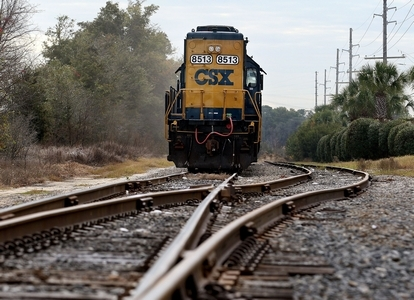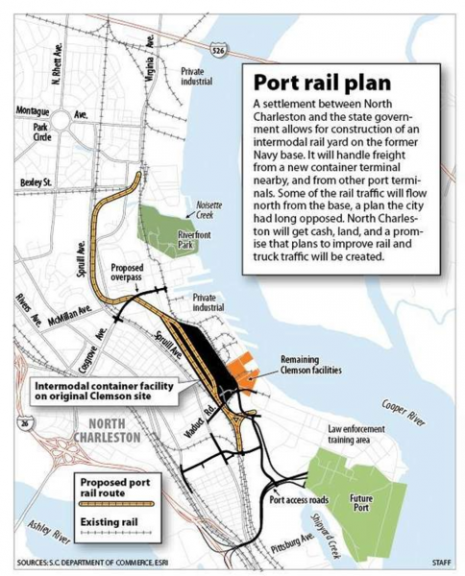
For media or press inquiries, contact:


The state Budget and Control Board this morning approved a settlement between the city of North Charleston and the state, clearing a path for a rail yard on the former Navy base.
The move follows a vote by the North Charleston City Council Tuesday evening which ended the costly legal battle with the state over rail access to a new port terminal.
“Long after we’re gone, there will be tremendous rewards,” she said.
The city fought the state’s plan for years, racking up about $750,000 in legal bills, because of fears that rail traffic would harm neighborhoods north of the base.
City officials also were angry about the state’s secretive purchase of land on the base, after a city-affiliated redevelopment effort was foreclosed upon, as well as the state’s decision to ignore an agreement between the city and State Ports Authority regarding rail plans for the port.
On Tuesday the acrimony was brushed aside as city and state officials jointly celebrated the mediated settlement, following a 9-1 council vote to approve the plan. Councilman Bobby Jameson cast the “no” vote.
What the city will get is $8 million, more than 100 acres of the waterfront land at the north end of the former base around Riverfront Park, and an agreement that the state will undertake a major transportation study aimed at improving rail and truck traffic in the city.
The state also will pay off $6.6 million in debt associated with redevelopment work on the former base, which included creating the park.
The state will get most of what it had wanted — a rail yard on the base, on land now owned by Clemson University, with rail access from the north and south. It’s a plan the state has said is necessary so that the region’s major railroads, CSX and Norfolk Southern, can jointly serve the port.
Some city residents long opposed to the idea of more freight trains coming near their homes said the deal appears to be the best the city could get.
“I think if they accept all the terms the city put out, we’ll fare better than if (the state) just ran roughshod over us,” said Gayle Frampton, president of the North East Park Circle neighborhood council. “North Charleston is commerce-friendly, but we demand that they respect the community.”
Cindy Coats, who lives near an active rail line in the Old North Charleston neighborhood, said she and other residents knew there were trains nearby when they moved to the area.
“But we don’t want (trains) to stop and start and back up right in front of schools,” said Coats, who also heads the Charleston County School Board. “This (settlement) is supposed to mitigate some of that.”
While the deal allows for rail traffic flowing north from the former Navy base, Mayor Keith Summey said it will eliminate the use of an existing rail line that follows Spruill Avenue through neighborhoods and the thriving business district on East Montague Ave.
For the city, a series of land swaps with the state is an attractive part of the plan. North Charleston will gain control over the northern tip of the former base, essentially reviving plans to redevelop that area, which includes historic officers’ housing.
The city will give the state a smaller amount of land, in what will be the more industrial parts of the former base.
“It basically gives us control of the waterfront, from the shipyard north,” Summey said.
The northbound port rail will go around the land that will be transferred to the city, rather than through it as the state had planned.
The mayor noted that the state spent about $22 million buying land on the former base, when the Noisette redevelopment properties went into foreclosure, and the state will now give the city about half that land back, plus nearly $15 million in cash and debt assumption.
For the state, the deal means a green light for the port rail vision pursued by the Commerce Department and its Division of Public Railways. The intermodal rail yard will serve not only the new port on the former base, but will handle shipping containers trucked from the North Charleston and Wando port terminals.
“One of the great things about this is all the trucks we’ll take off Interstate 26,” said Sen. Hugh Leatherman, who attended the joint press conference after the council meeting.
Haley called the port rail deal “leadership at its finest” and a deal that means “jobs, jobs, jobs.”
The rail yard will cost an estimated $128 million. The state has not identified funding for the project, which could take years to complete.
City and state officials all said an important part of the settlement agreement is a transportation study aimed at improving rail and truck traffic in North Charleston.
The plan, which Summey said could be completed in 2013, would examine ideas such as building overpasses at busy rail crossings, creating “quiet zones” for trains, and reducing the times when long freight trains block roads.
Reach David Slade at 937-5552 or Twitter @DSladeNews.
[email protected] or call us at +1 843.767.9300